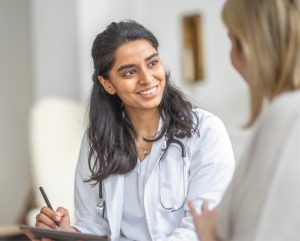 Stomach cancer, or gastric cancer, accounts for less than two percent of all new cancers diagnosed in the U.S. annually. It primarily affects older adults; 68 is the average age of diagnosis. According to the American Cancer Society, the lifetime risk of developing stomach cancer is higher in men (about 1 in 96) than in women (about 1 in 152). However, each person’s risks can be impacted by many factors.
Stomach cancer, or gastric cancer, accounts for less than two percent of all new cancers diagnosed in the U.S. annually. It primarily affects older adults; 68 is the average age of diagnosis. According to the American Cancer Society, the lifetime risk of developing stomach cancer is higher in men (about 1 in 96) than in women (about 1 in 152). However, each person’s risks can be impacted by many factors.
Once one of the leading causes of cancer deaths in the U.S. (and still one of the leading causes of cancer-related deaths in other parts of the world), the incidence rate of stomach cancer has dropped dramatically in the last 10 years. Researchers credit this to the increased use of refrigeration for food storage and the availability of antibiotic treatments that eliminate ulcer-causing bacteria.
Understanding the Stomach and Stomach Cancer
The stomach, a pouch-like organ in the upper abdomen, is an essential part of the digestive system. In fact, it is one of many organs in the abdomen (which many people call the belly area), including the small intestine, colon, liver, spleen and pancreas.
The esophagus delivers food to the stomach, which then mixes it, breaks it down and passes it on in small portions to the small intestine. The stomach wall is made up of several layers of mucous membranes, muscle fibers and connective tissue with blood vessels and nerves.
Nearly all stomach cancers develop from the gland cells in the innermost lining of the stomach (the mucosa) and tend to develop slowly over many years. There are many forms of stomach cancer. Pre-cancerous changes in the stomach often go undetected because, early on, they rarely cause any symptoms. Some symptoms are identical to conditions other than cancer.
Signs and symptoms can include:
• Poor appetite or weight loss (without trying)
• Abdominal (belly) pain, discomfort or swelling, usually above the navel (or belly button)
• Feeling full after eating a small meal
• Heartburn or indigestion
• Nausea or vomiting, with or without blood
• Trouble swallowing
• Blood in the stool
• Feeling tired or weak because of having too few red blood cells (anemia)
• Yellowing of the skin and eyes (jaundice) if the cancer spreads to the liver
If you have any of these issues for an extended period, especially if they don’t go away or worsen, you should see your healthcare provider.
Currently, there are no routine screening tests to detect stomach cancer, although research is continuing. For adults who may be at higher risk due to chronic gastric issues, certain genetic syndromes or a family history of stomach cancer, doctors may recommend an endoscopy screening. This procedure views inside the esophagus, stomach and upper part of the small intestine to check for abnormal areas.
Reduce Your Cancer Risk
Smoking and a poor diet have long been associated with a higher risk of stomach cancer. Follow these tips for a healthy lifestyle and to reduce your risk for many forms of cancer:
• Avoid eating large amounts of salty foods, such as salted fish and meat or pickled vegetables
• Avoid eating processed, grilled or charcoaled meats on a frequent or regular basis
• Eat lots of fresh fruits (citrus fruits in moderation) and vegetables
• Avoid tobacco use
• Use alcohol in moderation; three or more drinks per day seems to increase the risk of stomach cancer
Treatments
There are many forms of stomach cancer, and the recommended treatment is determined based on the type and stage of the disease. Treatment may include surgery, radiation, targeted therapy or immunotherapy, which uses the body’s immune system to disrupt the growth and spread of tumor cells.
New Options Through Clinical Trials
Advancements in the diagnosis and treatment of all forms of cancer continue at a rapid pace, thanks to ongoing clinical research. Clinical trials have played a significant role in these advancements, now saving more lives. Patients participating in these safe and carefully supervised groundbreaking research studies receive the latest treatments available, which can positively impact their outcomes.
WORLD-CLASS CANCER TREATMENT, CLOSE TO HOME
About Florida Cancer Specialists & Research Institute, LLC: (FLCancer.com)
Florida Cancer Specialists & Research Institute (FCS) offers patients access to more clinical trials than any private oncology practice in Florida. The majority of new cancer drugs recently approved for use in the U.S. were studied in clinical trials with FCS participation.* Recognized for our research, FCS is a recipient of the national Clinical Trials Participation Award presented by the American Society of Clinical Oncology (ASCO). FCS physicians, trained in prestigious medical schools and research institutes, are consistently ranked nationally as Top Doctors by U.S. News & World Report.
Founded in 1984, FCS has built a national reputation for excellence that is reflected in exceptional and compassionate patient care, driven by innovative clinical research, cutting-edge technologies and advanced treatments, including targeted therapies, genomic-based treatment and immunotherapy. Our highest values are embodied by our outstanding team of highly trained and dedicated physicians, clinicians and staff.
*Prior to approval
Florida Cancer Specialists & Research Institute
Boca Raton
21020 State Road 7, Ste 200C
Boca Raton, FL 33428-1320
Delray Beach
5130 West Linton Blvd, Ste B4
Delray Beach, FL 33484-6595
Lake Worth
4801 S Congress Ave, Ste 400
Palm Springs, FL 33461-4746
Palm Beach Gardens
3401 PGA Blvd, Ste 200
Palm Beach Gardens, FL 33410-2824
Wellington North
1037 S State Road 7, Ste 303
Wellington, FL 33414-6140
West Palm Beach
1309 N Flagler Dr
West Palm Beach, FL 33401-3406
For more information, visit FLCancer.com
 South Florida Health and Wellness Magazine Health and Wellness Articles
South Florida Health and Wellness Magazine Health and Wellness Articles




